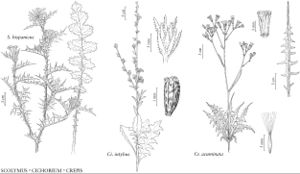Cichorium
Sp. Pl. 2: 813. 1753.
Gen. Pl. ed. 5, 354. 1754.
| Taxon | Illustrator ⠉ | |
|---|---|---|
 | Scolymus hispanicus Cichorium intybus Crepis acuminata | Marjorie C. Leggitt Barbara Alongi Bee F. Gunn |
Perennials [annuals, biennials], [2–] 10–120+ cm; taprooted. Stems usually 1, erect, branched distally or throughout, setose or hispid to pilose, or glabrous. Leaves basal and cauline; usually sessile; basal blades oblanceolate to lance-linear, margins usually runcinate-pinnate to dentate, rarely entire; cauline similar, smaller, margins dentate or entire. Heads mostly in glomerules (axillary and nearly sessile), some borne singly (on ± elongate peduncles). Peduncles (dimorphic: most 0–2 mm, some 12–85+ mm): the longer often slightly inflated distally, not bracteate. Calyculi 0 (or interpreted as outer phyllaries). Involucres ± cylindric, 3–5+ mm diam. Phyllaries 10–15+ in 2+ series, lanceovate to lanceolate or linear, unequal, margins little, if at all, scarious, apices obtuse to acute. Receptacles flat, pitted, ± hispid, usually epaleate. Florets 8–25+; corollas usually blue [purple], sometimes pink or white. Cypselae brownish, ± prismatic (3–5-angled), not beaked, faces smooth, glabrous; pappi persistent, coroniform (of 40–60+, whitish, subequal, erose scales in 1–2 series). x = 9.
Distribution
Introduced; Europe, n Africa, Asia, also in South America, Africa, Pacific Old World
Discussion
Species 6 (1 in the flora).
The salad green known as endive (Cichorium endivia Linnaeus) may sometimes be found as an escape from gardens or agricultural plantings. It differs from C. intybus in having purple corollas, cypselae 1.5–2.5 mm, and pappi 0.6–1+ mm.
Selected References
None.
Lower Taxa
"fine" is not a number.